Throughout history, diverse black personalities established themselves in a significant way, leaving contributions in science, economics, politics, society, culture, etc. Racism has often contributed to keeping these personalities in relative or total erasure, and historiography has been rescuing and giving them new representation.
Throughout this text, we separated eight black men and eight black women who were significantOs in history, contributing to changing the trajectory of the planet. These personalities are:
Zombie
Harriet Tubman
Toussaint Louverture
Yaa Asantewa
Jesse Owens
Carolina Maria de Jesus
Martin Luther King Jr.
Rosa Parks
Malcolm X
Elizabeth Eckford
Frantz Fanon
Wangari Maathai
Nelson Mandela
Ellen Johnson Sirleaf
Angela Davis
Michael Jackson
Read too:After all, what is black consciousness?
Who are the most important black personalities in history?
-
Zombie: he is one of the most significant black personalities in the history of Brazil. We know very little about his life, but we know that he was the
last leader of Quilombo dos Palmares, before its destruction. This was the largest quilombo in Brazilian history, existing throughout the 17th century.Zumbi was murdered by bandeirantes in 1695, becoming a symbol of the struggle and resistance against slavery in Brazil. To learn more about this leader's trajectory, click here.
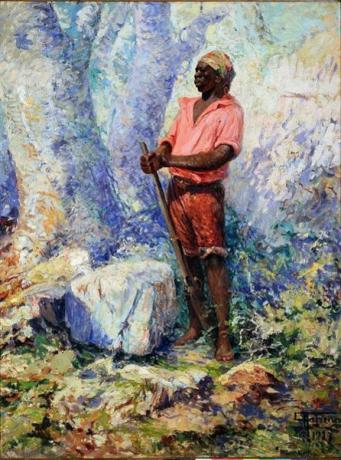
-
Harriet Tubman: She was an African-American woman who became known as one of the most powerful personalities in the fight against slavery in that country. She was born in the early 1820s in Maryland, enslaved, but gained her freedom by escaping her captivity.
After her escape, she took on the role of guide who took escaped slaves to the northern states of the United States or Canada (where slavery did not exist). In this way, he was responsible for leading hundreds of African Americans to freedom. To learn more about Tubman's career, click here.
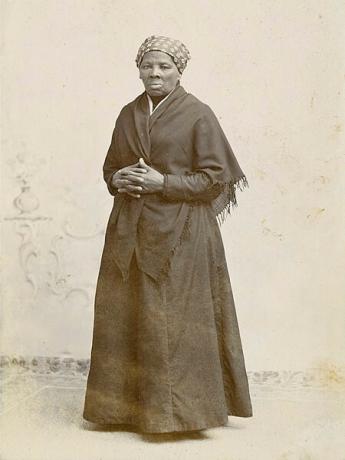
Toussaint Louverture: was a Haitian general and politician who led the fight for Haitian independence from the 18th to the 19th century. He was born enslaved, but gained his freedom throughout his life. With the beginning of a revolt in Haiti, he became a military leader in the Haitians' fight against French colonialism and slavery. He was captured by the French and sent to a prison in France, where he died in 1803.

Yaa Asantewa: it was one queen in the Ashanti Empire, being recognized as a great warrior who fought against the British in Africa. She was born in Besease, now Ghana, but then part of the Ashanti Empire. He became regent after the king and his brother died. She led a rebellion against the British, being captured and sent into exile.
![Statue of Yaa Asantewa in Ghana.[2]](/f/4c14d0ef2c393383d61a1a1a9de292f3.jpg)
-
Jesse Owens: was an American athlete who went down in history as the man who opposed Adolf Hitler in Nazi Germany. He was born in Alabama in 1913, the son of a poor black farmer. He joined the sport in the 1930s, participating in the Munich Olympics in 1936.
Germany was under the rule of Hitler, and Jesse Owens conqueror four gold medals for the United States, the first black man in history to do so. By winning the tests, Owens showed the falsehood of the theories of white racial superiority, defended by the Nazis.
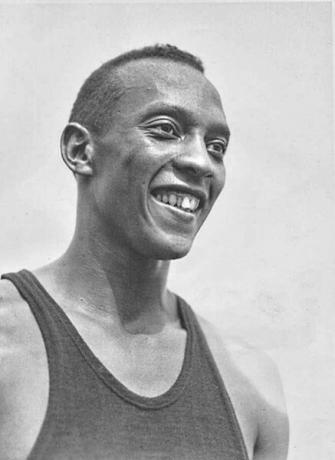
-
Carolina Maria de Jesus: it was one writer from Minas Gerais who gained national and international recognition because of your book Dump room: diary of a favela dweller. She was a mother of three children, and decided to move to São Paulo to guarantee her livelihood. She wrote this work based on her experiences in the Canindé favela.
She is considered one of the most important black writers in Brazil, with her books being internationally recognized. He lived part of his life as a writer ostracized due to racism, which made his writings invisible. Her books exactly denounce racism and the invisibility of black women in Brazil. To find out more, click here.

-
Martin Luther King Jr.: was a Baptist pastor and one of the great names in the fight for civil rights for African Americans in the United States, in the 1950s and 1960s. Born in 1929, in the state of Georgia, his life was marked by racism. In the 1950s, he became an icon of civil disobedience and peaceful activism in the fight against racism in the USA.
He assumed this leadership role after Rosa Parks' act of civil disobedience in Montgomery, Alabama. He led several peaceful protests and gave several recognized speeches, such as I Have a Dream. He was awarded a Nobel Peace Prize in 1964 and was assassinated in 1968. To find out more, click here.
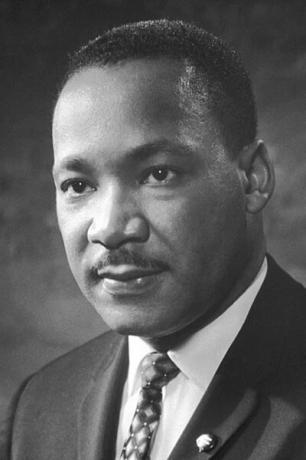
Rosa Parks: She was an important personality in history for having carried out an act of disobedience to racial segregation in the United States. Parks stayed marked for refusing to give up his seat on the bus to a white person, in Montgomery, Alabama, in 1955. His act gave strength to the African-American struggle for civil rights in the United States. To learn more about his story, click here.
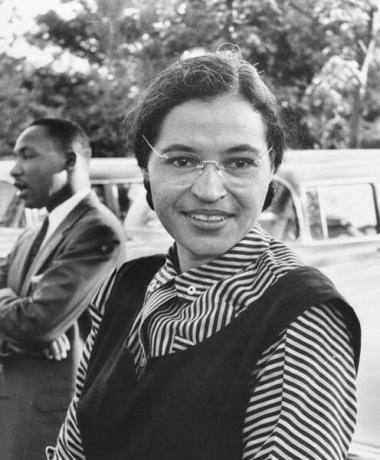
-
Malcolm X: He was an American activist who fought for the civil rights of the African-American population in the United States during the 1950s and 1960s. He converted to Islam in the 1950s, joining the Nation of Islam, which fought for the emancipation of black people in the USA.
She opposed Martin Luther King Jr. on the issue of violence, claiming that black people should defend themselves by using it as a form of self-defense. Furthermore, she argued that the fight against racism should be international, uniting black people from all over the planet. She was a critic of imperialism and supporter of Pan-Africanism. He was murdered in 1965. To find out more, click here.
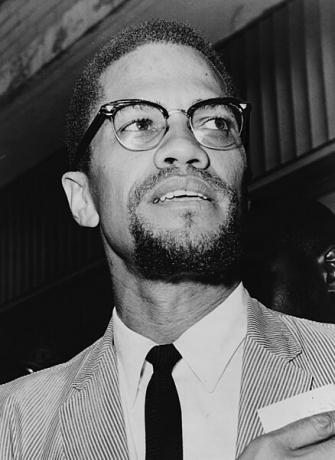
Elizabeth Eckford: was marked as black student who was enrolled in an all-white school in Arkansas. Eckford defied the racism of 1950s America by attending school to the scorn of whites. On her first day, she was surrounded by a crowd of white people who insulted her as she walked towards school.
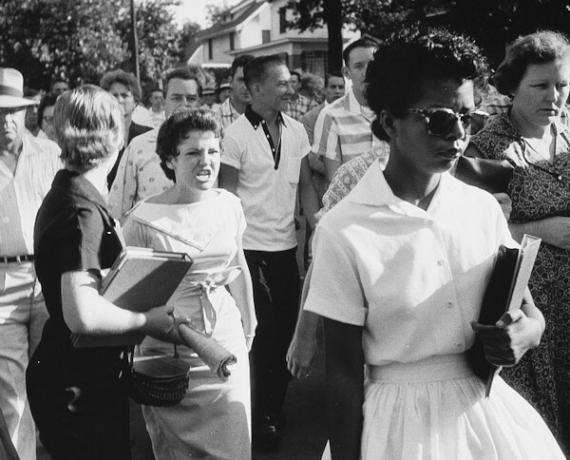
Frantz Fanon: He was an intellectual from Martinique, and became known as a psychiatrist and philosopher. She went one of the main black thinkers of the 20th century. She worked as a psychiatrist during the Algerian War, starting a series of studies on colonialism. She denounced colonial violence, becoming a reference on the subject. She died in 1961, at the age of 36, due to leukemia.
![Book cover by Frantz Fanon.[3]](/f/191b6f9bafb397f380146d0f3a2ad149.jpg)
-
Wangari Maathai: She was a teacher and activist born in Kenya in 1940. She was internationally recognized for her engagement in environmental causes, being the first African woman to receive a Nobel Peace Prize, in 2004.She had a master's degree in biology and a doctorate in veterinary anatomy, developing a concern with deforestation.
In 1977, he founded the Green Belt movement, with the aim of encouraging the reforestation of the planet. This project guaranteed employment for rural workers who planted trees, working in different parts of the planet and mainly in Kenya. It is estimated that the Maathai project was responsible for planting more than 50 million trees.
![Wangari Maathai in 2005.[4]](/f/187ef1f4ae188a96b8b83e627e969760.jpg)
-
Nelson Mandela: was a South African activist and politician who was known as the great name in the fight against apartheid in South AfricaApartheid was the racial segregation regime that was established in that country in 1948. Mandela led acts of civil disobedience against apartheid, and for this he was arrested and held in prison for 27 years.
In 1990, he was released by the South African government and worked alongside President Frederik de Klerk to lead the transition process to the end of apartheid in South Africa. In 1993, he received a Nobel Peace Prize, and the following year he was elected president of South Africa, becoming the first black person to govern the country. To learn more about Mandela, click here.
![Nelson Mandela in 1994.[5]](/f/ee3c2487b1b0c9e24bd26e38b276d46d.jpg)
-
Ellen Johnson Sirleaf: is a Liberian policy that was marked by having been the first woman to preside over a country on the African continent. She was born in Monrovia, the capital of Liberia, graduated abroad and returned to Liberia in the 1970s to serve as Minister of Finance.
She opposed a military coup in Liberia and was arrested for doing so. She became president of Liberia, serving in the role between 2006 and 2018. She was the first woman in this position on the entire African continent. In 2011, she was nominated for the Nobel Peace Prize for her role in fighting for women's rights and safety during the peace-building process in Liberia.
![Ellen Johnson Sirleaf speaking to the UN General Assembly.[6]](/f/54537d1b814d1e20a56176a2fb6d0af0.jpg)
Angela Davis: is a writer, philosopher and activist, known as one of the most relevant figures in the fight against racism in the 20th and 21st centuries. She was born in 1944, in the United States, joining the movement that fought for the civil rights of African Americans, the Black Panthers, a group that defended the armed struggle of black people against racism. Ideologically aligned with Marxism, Davis is one of the big names in the fight against racism not just in the United States, but across the planet. To find out more, click here.
![Angela Davis in 2019.[7]](/f/7d8baaf952aa49b83f71ba5ee55706ce.jpg)
Michael Jackson: was an American singer, dancer and composer who became known as one of the greatest artists in the history of music. His success was so great that he is now known as the “king of pop”, being the author of songs and dances that marked the 20th century and are still extremely famous. He suffered from vitiligo and died in 2009, victim of an overdose of sedatives. To find out more, click here.

Other important black personalities:
Kwame Nkrumah
Alexandre Dumas
Chimamanda Ngozi Adichie
Sueli Carneiro
Milton Santos
Skin
Gilberto Gil
Muhammad Ali
Image credits:
[1] Antonio Scorza/Shutterstock
[2] Wikimedia Commons
[3] hamdi bendali / Shutterstock
[4] Joseph Sohm/Shutterstock
[5] Wikimedia Commons
[6] katz / Shutterstock
[7] Wikimedia Commons
[8]Vicki L. Miller/Shutterstock
Sources
GOMES, Flávio dos Santos; LAURIANO, Jaime and SCHWARCZ. Black Encyclopedia. São Paulo: Companhia das Letras, 2021
FREIXA, Omer. Frantz Fanon: a classic for understanding colonialism. Available in: https://brasil.elpais.com/cultura/2021-12-03/frantz-fanon-um-classico-para-entender-o-colonialismo.html
WABA, Pinado Abdu. Yaa Nana Asantewaa: the warrior queen of Ghana. Available in: https://www.dw.com/pt-002/yaa-nana-asantewaa-a-rainha-guerreira-da-na%C3%A7%C3%A3o-ashanti-do-gana/a-41770230
NEAB. UFRGS. Wangaru Muta Maathai (1940-2011). Available in: https://www.ufrgs.br/africanas/wangari-muta-maathai-1940-2011/
POMBO, Cristiano Cipriano and MARTINO, Rodolfo Stipp. 40 years ago, Jesse Owens, who challenged Nazism and racism, died. Available in: https://www1.folha.uol.com.br/banco-de-dados/2020/03/ha-40-anos-morreu-jesse-owens-que-desafiou-nazismo-e-racismo.shtml
Source: Brazil School - https://brasilescola.uol.com.br/historiag/16-personalidades-negras-que-mudaram-a-historia-do-mundo.htm
